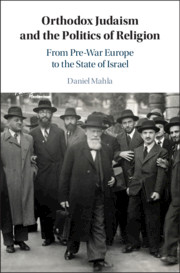Book contents
- Orthodox Judaism and the Politics of Religion
- Orthodox Judaism and the Politics of Religion
- Copyright page
- Dedication
- Contents
- Acknowledgments
- A Note on Terminology
- Introduction
- 1 Of Priests and Prophets
- 2 The Genesis of Orthodox Political Camps
- 3 Interwar Poland
- 4 Divisive Land
- 5 A New Era in Orthodox Relations
- 6 Emerging Israeli Milieus
- Epilogue
- Appendix
- Notes
- Bibliography
- Index
Introduction
Contentious Dynamics and the Transformation of Religion
Published online by Cambridge University Press: 06 March 2020
- Orthodox Judaism and the Politics of Religion
- Orthodox Judaism and the Politics of Religion
- Copyright page
- Dedication
- Contents
- Acknowledgments
- A Note on Terminology
- Introduction
- 1 Of Priests and Prophets
- 2 The Genesis of Orthodox Political Camps
- 3 Interwar Poland
- 4 Divisive Land
- 5 A New Era in Orthodox Relations
- 6 Emerging Israeli Milieus
- Epilogue
- Appendix
- Notes
- Bibliography
- Index
Summary
On a hot summer day in August 1953, Zerach Warhaftig and Haim-Moses Shapira, two national-religious politicians and members of the Israeli parliament, embarked on a trip from Jerusalem to the city of Bnei Brak near Tel Aviv.1 Jerusalem was the abode of the Knesset, the parliament of the young Israeli state. Compared to Jerusalem, Bnei Brak was rather peripheral to the national enterprise. Founded as an agricultural settlement by Polish hasidim in 1924, by the 1950s it had grown into a small city with some 20,000–25,000 inhabitants. No central governmental facilities or other institutions of national significance were located there.2 Yet Bnei Brak was home to a different kind of authority. In the city resided the gray-bearded 73-year-old Rabbi Abraham Isaiah Karelitz, better known by the name of his magnum opus, Hazon Ish.3 It was this eminent rabbinic authority, esteemed particularly by non-Zionist Orthodox Jews in Israel, that Warhaftig and Shapira had come to visit. Several days earlier, Karelitz had penned a letter to representatives of the national-religious parties, Mizrahi and Ha-Poel Ha-Mizrahi. In that letter he had urged the politicians to vote against an amendment to the Defense Service Law that was being discussed in the Knesset during those very days.
- Type
- Chapter
- Information
- Orthodox Judaism and the Politics of ReligionFrom Prewar Europe to the State of Israel, pp. 1 - 22Publisher: Cambridge University PressPrint publication year: 2020



